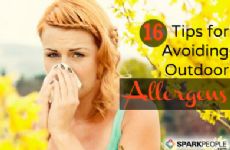|
I’m lucky that I’ve never had to deal with seasonal allergies, but I know a lot of people who do. When springtime hits and there’s a thick layer of pollen on the open windowsills in my house, it’s only a matter of time before some of my family members are affected. My husband has trouble cutting the grass without fits of sneezing for hours afterward, and my daughter always has a runny nose when she comes in from playing. This year we experienced a very mild winter in my area and spring seemed to come earlier than usual. As a result, their symptoms showed up earlier as well. Seasonal allergies affect more than 35 million people in the United States. Common symptoms include sneezing, congestion and itchy watery eyes. Most people don’t have symptoms serious enough to warrant a visit to their doctor (although asthma attacks can be one of those that do), but they can be enough to interfere with outdoor activities and make life uncomfortable. According to recent studies, spring (and therefore pollen) is arriving earlier each year with the rise in global temperatures. “In a study published last year, Agriculture Department researchers found that at certain latitudes, especially north of 44 degrees, the pollen seasons were up to a month longer than usual. In Wisconsin, for example, ragweed was in the air two weeks longer in 2009 than it was in 1995.” Another study from Harvard University concluded that these climate changes will cause ragweed pollen to increase significantly as time goes on. Not surprisingly, the number of allergy sufferers also appears to be increasing each year. Most experts agree that more studies are needed to determine the precise link between climate change and allergies, but there is definitely enough initial research to warrant further investigation. So do your part to save the planet and reduce carbon dioxide emissions, and you might just save yourself from some of the discomfort of seasonal allergies in the process. Although many of the risk factors are out of your control, you can reduce symptoms and possible reactions by making simple changes. Check out SparkPeople’s Seasonal Allergy Condition Center to find out how. What do you think? Do you suffer from seasonal allergies? If so, how do you deal with them? |
More From SparkPeople
|






















